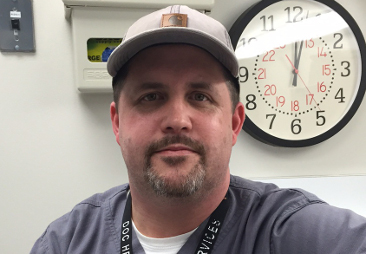|
|
| Being a DOC Nurse Requires Open Mind, Google Skills |
| By Andrew Garber, Washington Department of Corrections |
| Published: 06/27/2016 |
 ABERDEEN — Being a prison nurse isn’t a career many people would put at the top of their wish list, but Damon Gordon thinks they should.
ABERDEEN — Being a prison nurse isn’t a career many people would put at the top of their wish list, but Damon Gordon thinks they should.
“I get up every day and I want to go to work,” says Gordon, 42, a nurse at the Stafford Creek Corrections Center in Aberdeen. He acknowledges that may be unusual. Gordon recalled one of his college nursing instructors asking students where they wanted to work after graduation. “Nobody wanted to be a corrections nurse,” he said, “except me.” But nurses should consider a career in corrections, he said, noting that they’ll get to treat a variety of medical conditions they’re unlikely to see elsewhere because of the lifestyle inmates often led before entering prison, including drug and alcohol abuse. Gordon, on a regular basis, sees rare cancers, lung disease, heart disease, liver disease, diabetes, hepatitis and various types of ulcers and pressure wounds. “It’s pretty much anything you can think of,” he said. Gordon’s supervisor, Jamie Newton agreed. “I’ve seen things here that I’ve never seen anywhere else in my 30 years as a nurse,” she said, including a condition called rhabdomyolysis, which can happen when someone over exercises part of their body. “I’ve never Googled so much in my life,” said Newton, who worked in public health for decades before taking a Corrections nursing job. “We get these diagnosis and I say, ‘I’ve never heard of that.’” Gordon’s love of the job can be explained in part by the route he took. He spent a decade working as a corrections officer, first at the Monroe Correctional Complex and then at Stafford Creek, before deciding he wanted to be a nurse. His interest in nursing was sparked while he worked as a corrections officer at the Stafford Creek medical clinic. “I was intrigued by the nursing profession. The job in general,” he said. “My personality fit better with nursing. It was patient care, helping people. There’s just so much involved with the nursing side.” Gordon wanted to be a prison nurse so much, in fact, he worked night shifts in the prison’s master control room so that he could attend college classes during the day. “I’d get off work at 6 a.m., run home, take a nap for an hour and go to school from 9 a.m. to 1 p.m., then study, go to sleep and go back to work at 9:30 p.m.” The routine, which lasted four years, meant little sleep, and constant quizzes by the team of nurses he’d eventually be working with. Working in master control, Gordon was responsible for taking the nurses’ personal keys and handing them their work keys when they arrived during the morning, and the reverse if they had to work late at night. “We’d quiz him every morning and every night,” Newton said. “We’d quiz him on disease processes or give him an anatomy word. We’d come up with a word of the day and if he didn’t know, he’d have to look it up.” Newton said she knew from the start that Gordon would make a good nurse. “He has a very calming influence and goes with the flow, yet he does what needs to be done,” she said. “He’s somebody you want to be around and work with.” Gordon said one of the things he enjoys most about being a nurse is his ability to influence inmates to drop bad habits and become healthier. He sees it as a way to help incarcerated men change their behavior while in prison so that they can succeed once released. “They seem to listen to me now more than they did when I was a corrections officer,” he said. “As a nurse you can really educate them about how to improve their quality of life.” Dean, an inmate who was partially paralyzed before he entered prison, said the care Gordon and the other nurses provide is crucial for inmates. “To be real with you, just because we messed up and made bad mistakes, we’re still human beings,” said Dean, who is serving a sentence for leading organized crime. “We made choices and dealt with the consequences, but … I think it’s important that we get the same care as everybody on the streets.” Gordon agreed. “We’re not here to punish them,” he said of the incarcerated men he treats. “They have needs, they have families. They deserve to be taken care of just like anybody else.” Andrew Garber has more than 30 years’ experience as a reporter at daily newspapers in South Carolina, Florida, Maine, Idaho and Washington. He spent 14 years at The Seattle Times with most of that time as a statehouse reporter covering the governor's office, the Legislature and state government. He joined the Washington Department of Corrections in March 2015. |
Comments:
Login to let us know what you think
MARKETPLACE search vendors | advanced search

IN CASE YOU MISSED IT
|


Hats off to you Gorden for being a caring and professional nurse! Its wonderful to see that you care for your patients and treat them like the people that they are, and not just inmates. Its so heart warming to know that you look at them like people, and that you value their lives. You're a fantastic human being ... keep up the great work!